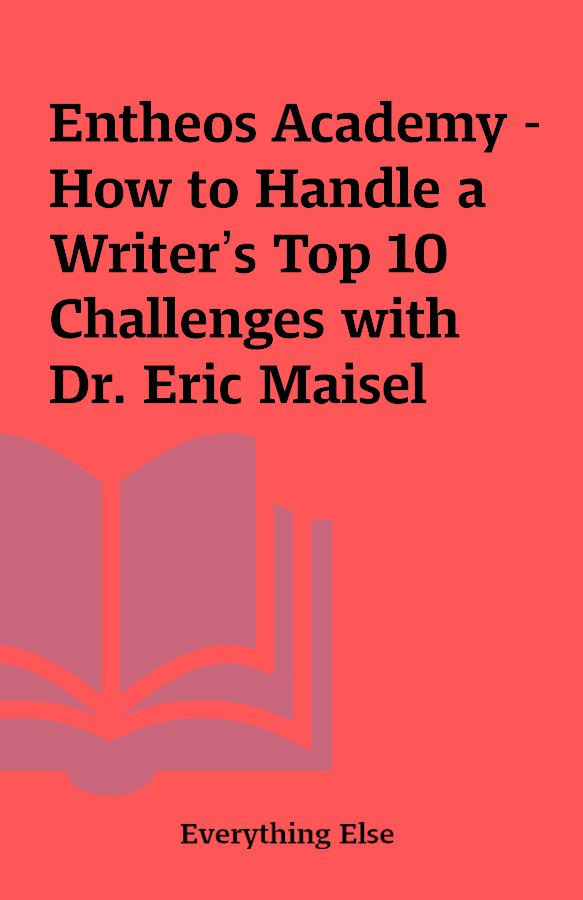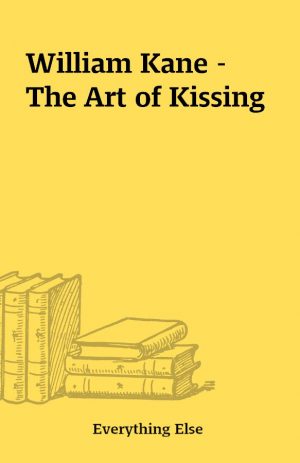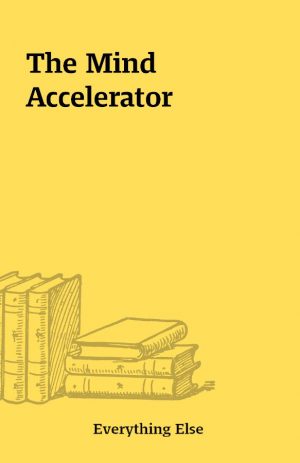Entheos Academy – How to Handle a Writer’s Top 10 Challenges with Dr. Eric Maisel
How to Handle a Writer’s Top 10 Challenges.mp4
[WebRip – 1 MP4]
Description
Class OverviewAs a writer, there are many things that get in the way of producing great work for our audiences. We must be aware of our challenges in order to move past them and create stunning works of art. (Check out the Top 10 Big Ideas from the class below!)Your ProfessorDr. Eric Maisel is the author of 40+ books and is one of the world’s leading creativity coaches. His interests include the creative life, creativity coaching, and natural psychology, the new psychology of meaning.How to Handle a Writer’s Top 10 ChallengesWho doesn’t want to write? Almost all intelligent, educated people believe that they have a book in them and secretly wish that they were a writer. But the writing life comes with enough challenges that most people are too daunted by those challenges to give writing a real try or, if they manage to give it try, to see it through. Those who do manage to write regularly then face a new set of challenges likely to stop them in their tracks. What are these challenges and how can they be handled? Let’s see! ChallengeThe Top 10 Big Ideas1The Facts of ExistenceAll human beings, writers included, are confronted by the facts of existence, the vagaries of circumstances, and the nature of the beast. We are born with more or fewer opportunities, a better or worse home environment, and more or fewer obstacles to overcome. Our personality becomes formed and then we have to deal with our own personality, which may pester us, keep us anxious, crave peanuts or vodka, and set us up for sadness. Everyone must deal with all of this, writers included. If our “depression” epidemic and “insomnia” epidemic are any indication, we aren’t dealing with the facts of existence all that well.2Your Creative NatureCreative people tend to have outsized appetites, pressing meaning needs, racing brain issues, a penchant for sadness, and other qualities and attributes that produce their own problems. Their outsized appetites easily lead to addictions, their pressing meaning needs easily lead to existential crises, their racing brain issues easily lead to uncontrolled manias and unproductive obsessions, and their penchant for sadness easily leads to “the mental disorder of depression.” If you are creative, you’re likely to have to deal with all of this.3Your Doubts, Fears and AnxietiesEverybody gets anxious. But some people get anxious in ways that prevent them from writing. Their anxiety manifests as “perfectionism,” as mind chatter that keeps good ideas away, as restlessness that makes staying put impossible, or in other ways that, as likely as not, they do not recognize as faces of anxiety. Writing, because it connects to your self-worth, your meaning needs, and your very identity, is experienced as a certain sort of risk; risk produces anxiety; and many writers and would-be writers find themselves silenced by their anxious reactions to risk.4The Nature of the TaskWriting is essentially thinking; and thinking isn’t easy. Writing is also imagining; and imagining isn’t easy. Writing is also a matter of sound architecture, of creating structure and form; and building solid structure isn’t easy. Why do we suppose that creating a memorable character, saying something new, or having our disparate themes come together in a knock-out ending is easy? That you can read doesn’t mean that writing is easy. That you can compose an email doesn’t mean that writing is easy. Writing is real work and makes demands on our brain and on our nervous system.5Routine, Regularity, Discipline and DevotionIt is one thing to only write “when the spirit moves us” or “as a hobby” or very occasionally. It is another thing to write in a routine way with the sort of regularity, discipline, and devotion that important projects get started and completed and that a body of work gets produced over time. It is easy for writers to skip days, weeks, months and years because they “aren’t in the perfect mood” to write or don’t find themselves in the “ideal circumstances to write.”6Doing Great WorkBecause our desire to write is connected to our meaning needs, our self-image, and our identity, we want our writing to be better than merely good. We secretly want it to be great, because if it is great then we are great. We identify with our writing, which is natural enough and also its own sort of trap. If you can’t get enough satisfaction from writing a solid play because it isn’t Hamlet or King Lear, then when will you experience satisfaction from writing? Craving excellence is understandable and desirable: and a danger.7Making MoneyThe vast majority of writers can’t earn a living from writing. How many doctors, accountants or lawyers would we have if medicine, accounting or the law paid $2000 or $3000 a year? Yes, some authors make a lot of money; but between 95% and 98% of writers earn very little from their efforts. This means that to be a writer is to invite poverty, to create relationship issues (and distress and discord), to set yourself up for a lifetime of meaningless day jobs or demanding second careers, to open the door wide to envy, and more; and all because writing rarely pays.8Handling ProcessThe process of creating comes with mistakes, messes, wrong steps and every manner of unfortunate reality. There are no guarantees and rarely any smooth sailing. If a would-be writer pines for smooth sailing or imagines that he or she can circumvent process, then when process “hits” a block will occur. It might be the case that you will spend two years writing a novel or a nonfiction book that never comes alive or that never comes together. That is the reality of process. Only a percentage of the projects that a writer undertakes—maybe a large percentage but maybe a small percentage—will turn out well.9Wanting to Give UpIt is one thing to find the wherewithal to start writing. It is another thing to find the wherewithal to keeping writing decade in and decade out in the face of countless rejections, poisonous criticism, little income, dashed hopes, and real world pressures. How easy is it to start a third novel if the first two have failed to find a publisher? How easy is it to start your fifth nonfiction book when your first four have sold a thousand copies each? What writer hasn’t wanted to give up more times than she can count? And many do.10Identifying Other Meaning Opportunities and InvestmentsWriters often put all of their “meaning eggs” into one basket, the basket of writing, and find it hard to experience anything else in life as meaningful. It’s important that writers get in the habit of making other meaning investments and seizing other meaning opportunities—relationships, service, activism, etc.—so that their experience of life as meaningful doesn’t rise and fall exclusively on whether the writing went well today or on whether they are having successes in the marketplace.
You must be logged in to post a review.






Reviews
There are no reviews yet.